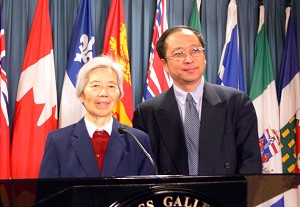Epoch Times Toronto Staff
Feb 02, 2006
|
|
Seventy-three-year-old Huang Daiming knows her rights. When an Ottawa Chinese seniors club revoked her membership over her practice of Falun Gong--apparently under pressure from the local Chinese Embassy--she filed a human rights complaint, and won.
In what was hailed as a precedent-setting decision last week, the Human Rights Tribunal of Ontario ordered the Ottawa Senior Chinese Cultural Association and two of its former executives to pay Ms. Huang $18,000 in damages, and gave instructions on how the Association must begin to implement pro-human rights policies.
The Ontario Human Rights Commission, which deals with discrimination claims and referred Huang's case to the Tribunal, said the ruling is significant because Falun Gong was found to be a "creed" under the human rights code. That means that others could receive similar protection in the future.
The decision is important because it signals how future complaints to the Commission will be viewed, OHRC communications manager Jeff Poirier told The Epoch Times in an interview. "This decision tells us clearly that persons with beliefs or practices in Falun Gong have the protection of the human rights code when it comes to discrimination in housing or services or employment."
In determining if Falun Gong fit the definition of a creed, the Tribunal heard testimony from Professor David Ownby, director of the Centre for East Asian Studies at the University of Montreal. Ownby, who has published numerous articles on the spiritual practice, said the essence of Falun Gong is "spiritual elevation" and its message is "profoundly moral." Ownby said that while Falun Gong lacked the institutionalized structure of many Western religions, scholars would generally regard it as a creed or religion.
Huang Daiming joined the seniors Association, which included fellow students from her English class, in 2001. She said she was invited to join in 1995 by previous executives but did not because of her poor health at the time.
Huang learned Falun Gong in 1998 and credits the practice with helping her overcome her ailments, including heart disease, joint inflammation and back problems.
At a New Year's party organized by the Association on December 29, 2001, Huang says she was approached by club secretary Xu Feng and then-Consul General of the Chinese Embassy, Huang Ping, who had learned that she was a Falun Gong practitioner.
"After Huang Ping left, the seniors association notified me that my membership in the Association was terminated simply because I practice Falun Gong," Huang told a news conference at the Parliament Hill press gallery on January 27.
Huang had been told by Guo Shen, the Association's chair at the time, that "the Association needed to maintain unity and solidarity with the Chinese government and that no Falun Gong practitioner could be a member of the Association."
This appears inconsistent with the organisation's own constitution, reviewed by the Tribunal, which describes itself as "a social organization without religious or political inclinations."
Huang had requested to see the Association's constitution several times herself but was denied; her phone calls and letters to Guo appealing to be reinstated went unanswered.
Also accepted by the HRTO where Huang's complaints that the Association slandered Falun Gong, publicly barred Huang from its activities and carried out a signing campaign against Falun Gong in what Tribunal Adjudicator Mary Ross Hendriks described as a "malicious manner."
Hendriks' awarded damage for the mental anguish Huang has suffered because of these events. Most of the elderly woman's friends from the Association have severed ties with her and those who've remained have implored her not to use their names publicly. Huang's "evidence about her cultural context and her ongoing behaviour since these events occurred are consistent with someone who feels persecuted," determined Hendriks. Professor Ownby has also noted that this case proves that the persecution of Falun Gong by the Chinese communist regime had been extended to Canada.
The Falun Dafa Association of Canada detailed numerous similar incidents in a recent statement. These incidents include a Montreal dance troupe, with some Falun Gong performers, that was barred from a community event because organizers didn't want to offend the Chinese embassy, and a Toronto practitioner fired for her belief by her Chinese employer who had close business ties with the communist regime. FDAC spokesperson Lucy Zhou, who also happens to be Huang's daughter-in-law, described how Chinese diplomats widely disseminate anti-Falun Gong propaganda to all levels of government, as well as to the media, schools, university campuses and libraries.
"We urge Canadians to recognize the true face of the persecution, not only as a campaign of torture, hate propaganda, and brainwashing inside the Chinese communist regime, but also as a severe campaign that has been extended to Canadian soil, targeting citizens like Ms. Huang," said Zhou.
So far, the Seniors' Association has declined to indicate how it will respond to the decision. In addition to paying damages, they have been ordered to end the ban on Falun Gong members, to prominently post the Human Rights code on the Association premises, and to include anti-discrimination provisions in their policies and constitution. Huang, who is looking forward to rejoining her friends, is very pleased with the HRTO's decision. "It sends an important message: This is Canada, not China," she says.
Source http://www.theepochtimes.com/news/6-2-2/37671.html
Category: Falun Dafa in the Media






